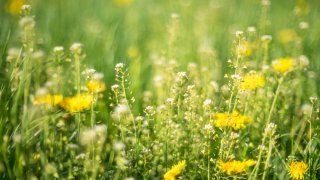
Some seasonal allergens are hitting their peak in the Chicago area, while others will likely hit in coming weeks and months this spring, according to allergy experts.
According to Loyola Medicine, trees are in their peak season from March to May, while grass will be in its peak season from May to June. Mold has its peak season in both spring and fall - whenever conditions are "damp."
For weed and ragweed, the peak season lasts from about mid-August until the first frost, experts noted.
Loyola Medicine ranks the counts from low to high risk, then "alert." When an allergen is marked as "alert," those sensitive are advised to stay indoors.
Feeling out of the loop? We'll catch you up on the Chicago news you need to know. Sign up for the weekly Chicago Catch-Up newsletter here.
Loyola Medicine's Allergy Count is updated each weekday morning during allergy season by allergist Dr. Rachna Shah, according to the Twitter account.
According to Loyola Medicine, the levels as of Thursday were reported to be:
Trees - low - most prevalent - Juniper
Local
Grass - absent
Molds - low
Weeds - absent
The count is collected daily on the roof of Gottlieb Memorial Hospital.
What exactly are allergies and why do people react differently?
If you have an allergy, your immune system overreacts to a substance you inhaled, touched or ate, according to the American Academy of Allergy, Asthma and Immunology.
"Allergies are inherited. People inherit the ability to be allergic, but they don't exactly inherit what they're allergic to," said Dr. Richard Wasserman, medical director of Pediatric Allergy and Immunology at Medical City Children's Hospital in Dallas, Texas. "So, people who have one parent with allergies have about a 50% likelihood of developing allergies. If both parents have an allergic disease, it's about 80%."
Seasonal allergic rhinitis, commonly known as hay fever, is usually triggered by outdoor allergens such as pollen and mold spores.
"Rose fever, hay fever are, kind of, colloquial names for allergy. Hay fever is probably mostly caused by mold," said Wasserman. "Mold is another thing that people get allergic to. Mold likes to grow in moist environments like haystacks or barns, so that's the association there."
According to Mayo Clinic, these are the most common seasonal allergy symptoms:
- Sneezing
- Itching of the nose, eyes or roof of the mouth
- Runny, stuffy nose
- Watery, red or swollen eyes (conjunctivitis)



